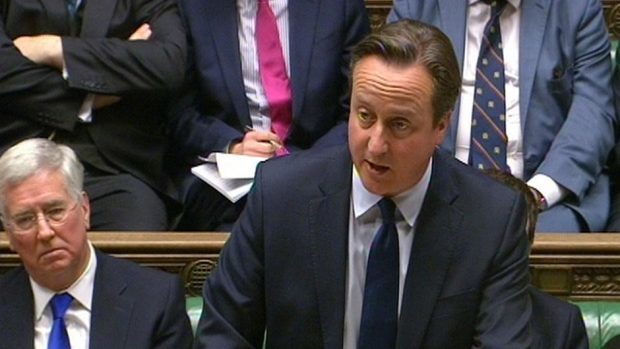The UK Government was accused last night of indulging in a “super-expensive vanity project” as it emerged replacing the submarines which carry Britain’s Trident nuclear deterrent could cost more than £40billion.
Ministry of Defence estimates now put the price tag for manufacturing four new subs at £31billion over a 20-year period compared to a previous figure of £25billion.
In addition, a further £10billion in “contingency” has been set aside in the Strategic Defence and Security Review (SDSR), unveiled by the prime minister in the Commons yesterday.
SNP Westminster leader Angus Robertson condemned the “ballooning” cost of replacing the Trident submarines, which he argued was “squeezing out” other defence alternatives.
Speaking in the Commons, Mr Robertson asked: “How expensive does it need to be for this government to realise it’s a super-expensive vanity project that does not deter?”
But Mr Cameron hit back, saying: “You would not think Scotland was getting more Typhoons, more maritime patrol aircraft and ships?
“The truth is this – the UK punches above its weight in the world and Scotland punches above its weight because it’s in the UK.”
MoD officials confirmed the previous £25billion estimate was based on 2006 figures, adding that the department was now taking a “more realistic” approach.
Moray MP Mr Robertson also accused the Tories of “betraying” Clyde shipworkers by scaling back the plan to introduce new Type 26 frigates from 13 to eight, which he said represented a 40% cut.
But Mr Cameron replied: “The fact is Scotland now has the opportunity to build more than 13 frigates because of the changes that we are making.
“So there will be eight of the Type 26s and at least another five of the new type of frigate, probably more, and they can be built in Scotland if the conditions are right.
“The only way these ships wouldn’t be built in Scotland is if Scotland was independent and didn’t have the national resources of the Royal Navy.”
Reacting outside the chamber after the announcements, SNP defence spokesman Brendan O’Hara said the decision on the P-8 Poseidon maritime patrol aircraft would “at long last” right “a terrible wrong”.
But the Argyll and Bute MP criticised the “total obsession” with Trident, which will be the subject of an SNP-led debate in the Commons today.
He added the review – which promises £11billion of efficiency savings to be detailed in the chancellor’s spending review tomorrow – proved “beyond doubt” the Tories’ intent to stick to their demands for austerity, even when it comes to defence.
Also included in the review were plans for two new Army 5,000-strong “strike brigades” capable of deploying rapidly around the world, as well as an additional £12billion of equipment funding.
But – in a move branded “devastating” by the unions – the MoD’s civilian workforce will be reduced by almost 30% to 41,000 over the next five years.
Asked whether the Paris attack had shaped the review, officials said they had been “running the rule” over the plans since the incident.
And Mr Cameron told MPs half of the 10,000 troops on standby to react if a similar attack happens on Britain’s streets were already trained.
Responding for Labour, Jeremy Corbyn said his party’s own defence review would learn the lessons from Iraq, Afghanistan and Libya “sadly lacking” from the UK Government’s analysis.
He added that the public would not understand or accept any cuts to frontline policing.
